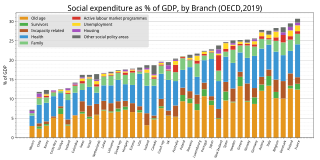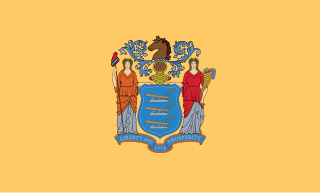Related Research Articles
A plutocracy or plutarchy is a society that is ruled or controlled by people of great wealth or income. The first known use of the term in English dates from 1631. Unlike most political systems, plutocracy is not rooted in any established political philosophy.

The Reign of Terror was a period of the French Revolution when, following the creation of the First Republic, a series of massacres and numerous public executions took place in response to revolutionary fervour, anticlerical sentiment, and accusations of treason by the Committee of Public Safety.

A welfare state is a form of government in which the state protects and promotes the economic and social well-being of its citizens, based upon the principles of equal opportunity, equitable distribution of wealth, and public responsibility for citizens unable to avail themselves of the minimal provisions for a good life.

The war on poverty is the unofficial name for legislation first introduced by United States President Lyndon B. Johnson during his State of the Union address on January 8, 1964. This legislation was proposed by Johnson in response to a national poverty rate of around nineteen percent. The speech led the United States Congress to pass the Economic Opportunity Act, which established the Office of Economic Opportunity (OEO) to administer the local application of federal funds targeted against poverty. The forty programs established by the Act were collectively aimed at eliminating poverty by improving living conditions for residents of low-income neighborhoods and by helping the poor access economic opportunities long denied them.

Welfare, or commonly social welfare, is a type of government support intended to ensure that members of a society can meet basic human needs such as food and shelter. Social security may either be synonymous with welfare, or refer specifically to social insurance programs which provide support only to those who have previously contributed, as opposed to social assistance programs which provide support on the basis of need alone. The International Labour Organization defines social security as covering support for those in old age, support for the maintenance of children, medical treatment, parental and sick leave, unemployment and disability benefits, and support for sufferers of occupational injury.
Welfare reforms are changes in the operation of a given welfare system, with the goals of reducing the number of individuals dependent on government assistance, keeping the welfare systems affordable, and assisting recipients to become self-sufficient. Classical liberals, libertarians, and conservatives generally argue that welfare and other tax-funded services reduce incentives to work, exacerbate the free-rider problem, and intensify poverty. On the other hand, socialists generally criticize welfare reform because it usually minimizes the public safety net and strengthens the capitalist economic system. Welfare reform is constantly debated because of the varying opinions on the government's determined balance of providing guaranteed welfare benefits and promoting self-sufficiency.

Karl Gunnar Myrdal was a Swedish economist and sociologist. In 1974, he received the Nobel Memorial Prize in Economic Sciences along with Friedrich Hayek for "their pioneering work in the theory of money and economic fluctuations and for their penetrating analysis of the interdependence of economic, social and institutional phenomena." When his wife, Alva Myrdal, received the Nobel Peace Prize in 1982, they became the fourth ever married couple to have won Nobel Prizes, and the first to win independent of each other. He is best known in the United States for his study of race relations, which culminated in his book An American Dilemma: The Negro Problem and Modern Democracy. The study was influential in the 1954 landmark U.S. Supreme Court Decision Brown v. Board of Education. In Sweden, his work and political influence were important to the establishment of the Folkhemmet and the welfare state. Myrdal and his wife advocated for social engineering.

Social policy is a plan or action of government or institutional agencies which aim to improve or reform society.
Ian Steven Lustick is an American political scientist and specialist on the modern history and politics of the Middle East. He currently holds the Bess W. Heyman Chair in the department of Political Sciences at the University of Pennsylvania.

The Pink Swastika: Homosexuality in the Nazi Party is a 1995 pseudohistorical book by Scott Lively and Kevin Abrams. Drawing on Samuel Igra's 1945 book Germany's National Vice, Lively and Abrams argue that the crimes committed by homosexuals in the Nazi Party exceed the persecution of homosexuals in Nazi Germany and that homosexuality contributed to the extreme militarism of Nazi Germany. They also contend that only feminine homosexuals were persecuted by the Nazis, while "butch" homosexuals formed the leadership cadre of the Nazi party. Historian Andrew Wackerfuss criticized the book for lack of accuracy and "outright homophobic charges". The claim advanced by Igra, Lively, and Abrams that homosexuals were responsible for Nazi atrocities is rejected by most historians.
Modern liberalism in the United States, often simply referred to in the United States as liberalism, is a form of social liberalism found in American politics. It is the dominant tendency within liberalism in the United States. It combines ideas of civil liberty and equality with support for social justice and a "checked-and-validated" market economy. Economically, modern liberalism opposes cuts to the social safety net and supports a role for government in reducing inequality, providing education, ensuring access to healthcare, regulating economic activity and protecting the natural environment. This form of liberalism took shape in the 20th century United States as the voting franchise and other civil rights were extended to a larger class of citizens. Major examples of modern liberal policy programs include the New Deal, the Fair Deal, the New Frontier, and the Great Society.

Slavery in New Jersey began in the early 17th century, when Dutch colonists trafficked African slaves for labor to develop the colony of New Netherland. After England took control of the colony in 1664, its colonists continued the importation of slaves from Africa. They also imported "seasoned" slaves from their colonies in the West Indies and enslaved Native Americans from the Carolinas.

Social programs in the United States are programs designed to ensure that the basic needs of the American population are met. Federal and state social programs include cash assistance, health insurance, food assistance, housing subsidies, energy and utilities subsidies, and education and childcare assistance. Similar benefits are sometimes provided by the private sector either through policy mandates or on a voluntary basis. Employer-sponsored health insurance is an example of this.
Linda Gordon is an American feminist and historian. She lives in New York City and in Madison, Wisconsin. She won the Marfield Prize for Dorothea Lange: A Life Beyond Limits, and the Antonovych Prize for Cossack Rebellions: Social Turmoil in the Sixteenth-Century Ukraine.

Paul K. Chappell is the Director of the Peace Literacy Institute peaceliteracy.org. A graduate of West Point and a veteran of the war in Iraq, he created the idea of Peace Literacy after his time in the military. He develops the idea further in his seven-book series The Road to Peace where he writes about waging peace, ending war, the art of living, and what it means to be human.
Welfare culture refers to the behavioral consequences of providing poverty relief to low-income individuals. Welfare is considered a type of social protection, which may come in the form of remittances, such as 'welfare checks', or subsidized services, such as free/reduced healthcare, affordable housing, and more. Pierson (2006) has acknowledged that, like poverty, welfare creates behavioral ramifications, and that studies differ regarding whether welfare empowers individuals or breeds dependence on government aid. Pierson also acknowledges that the evidence of the behavioral effects of welfare varies across countries, because different countries implement different systems of welfare.
Carl Abbott is an American historian and urbanist, specialising in the related fields of urban history, western American history, urban planning, and science fiction, and is a frequent speaker to local community groups. Since 1967 he has been married to Margery Post Abbott, a Quaker scholar and teacher.
Felicia Kornbluh is an American scholar, writer, and feminist activist and Professor of History and of Gender, Sexuality, and Women's Studies at the University of Vermont.

Laura Briggs is a feminist critic and historian of reproductive politics and US empire. She works on transnational and transracial adoption and the relationship between race, sex, gender, and US imperialism. Her 2012 book Somebody's Children: The Politics of Transracial and Transnational Adoption won the James A. Rawley Prize from the Organization of American Historians for best book on the history of US race relations and has been featured on numerous college syllabi in the US and Canada. Briggs serves as professor and chair of the Women, Gender, and Sexuality Studies program at the University of Massachusetts Amherst.
The Victoria Schuck Award is an annual prize granted by the American Political Science Association to the author of the best book published in the previous year on the topic of women and politics. The award is named in honor of the political scientist Victoria Schuck. Although a number of area-specific sections of the American Political Science Association have dedicated book awards, the Schuck Award is one of only a few awards given directly by the Association rather than by a subsection of it.
References
- ↑ "Update from Marisa Chappell". Emory University History Department News. August 23, 2011. Retrieved March 28, 2018.
- ↑ Chappell, Marisa (2011). The War on Welfare: Family, Poverty, and Politics in Modern America. University of Pennsylvania Press. Retrieved March 28, 2018.
- ↑ Levenstein, Lisa (June 1, 2011). "Marisa Chappell . The War on Welfare: Family, Poverty, and Politics in Modern America . (Politics and Culture in Modern America.) Philadelphia: University of Pennsylvania Press. 2010. Pp. xi, 345. $45.00". The American Historical Review. 116 (3): 841–842. doi:10.1086/ahr.116.3.841. ISSN 0002-8762.
- ↑ "The War on Welfare: Family, Poverty, and Politics in Modern America. Marisa Chappell. Reviewed by John M. Herrick". Journal of Sociology and Social Welfare. 2010. Retrieved March 28, 2018.
- ↑ "Historian explores results of 'The War on Welfare' in new book". Oregon State University. Retrieved March 28, 2018.